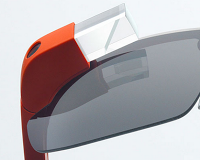So, what is the point of Google Glass again?
Jolie O’Dell, VentureBeat:

In my moral universe, Google Glass for consumers can only serve to distract us, not truly help us any more, better, or faster than the other tools we already use. For example, you already have Google Maps to guide you around your city with turn-by-turn audio navigation. That tool doesn’t get any better when it’s smack-dab against your eyeball. Neither does your email or your Instagram feed or your Facebook account.
While Jolie O’Dell’s full article is definitely worth a read as one of the first interesting counterpoints to all of the hype around Google Glass, I felt this one quote was a particularly good point that many in the tech blogosphere have missed in their effort to sing the praises of Google Glass and dream up real-world consumer uses for it. While the potential for practical professional uses are myriad, as a consumer product Google Glass seems like the proverbial solution in desperate search of solving some real-world problem that average people are actually having.
I can’t think of a single instance where I’ve ever thought, “Gee, pulling out my iPhone is far too inconvenient. I wish I could just have my Facebook feed or e-mail right in my eyeball.” In fact, for me the opposite is far more true — I actually like the fact that my iPhone is in my pocket when I don’t want to be distracted by whatever may be happening on the Internet. Such as when I’m playing with my daughter, or having dinner out with my wife or friends, or perhaps just doing something like watching a movie.
In fact, one could argue that this is the same design logic that goes into things like Google TV. Some tech enthusiasts may love the idea of being able to access their social media stream or look something up on Wikipedia or IMDb during their favourite movie. However, from my own — admittedly anecdotal — sample of friends and family I suspect that these folks are in the minority. In my world I generally prefer to actually watch the movie without distractions. On rare occasions I may want to look something up, such as an actor’s bio, but my smartphone is usually within reach and provides a more appropriate context by allowing me to pick it up, find what I need, and then put it away and return to the movie. Having that information available “in my face” might be more convenient in that particular moment, but ultimately it becomes too accessible and takes me away from what I’m actually doing.
Pulling out your smartphone is an important contextual shift, both psychologically and as a social signal to others. It clearly communicates both to your own mind and to others around you that you’re going into a different “mode” allowing you to effectively separate your interaction with the real world from your interaction with your mobile device. The same applies with most other physical items such as reading a book or newspaper or simply looking at photographs. Google Glass promises — or threatens, depending on your point of view — to remove that contextual distinction, blending the real world and the virtual world into a single, unified consciousness. There are definitely those who see this as a good thing, but ultimately I believe that it will create a newer and more dangerous kind of distraction — people being distracted without even realizing that they’re being distracted.